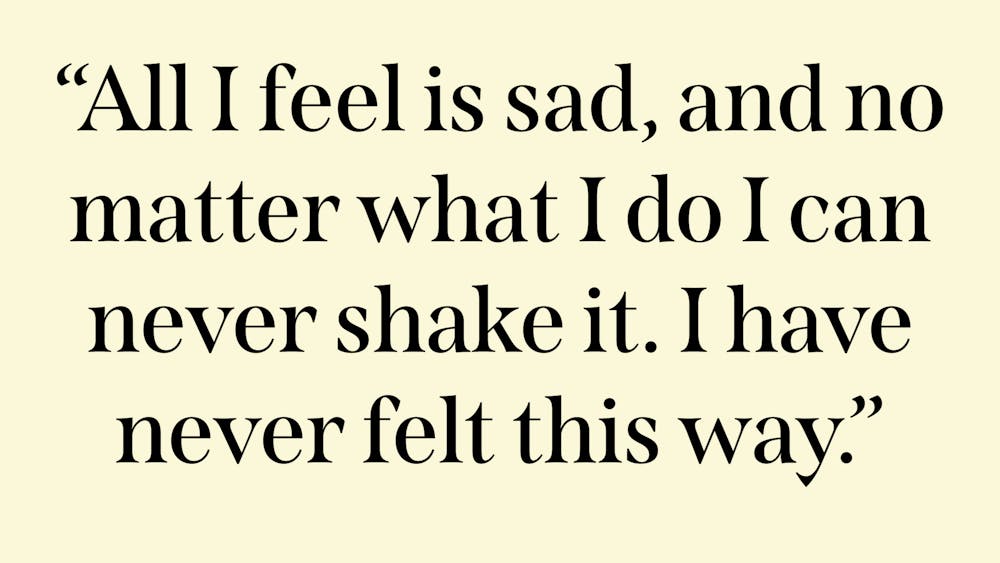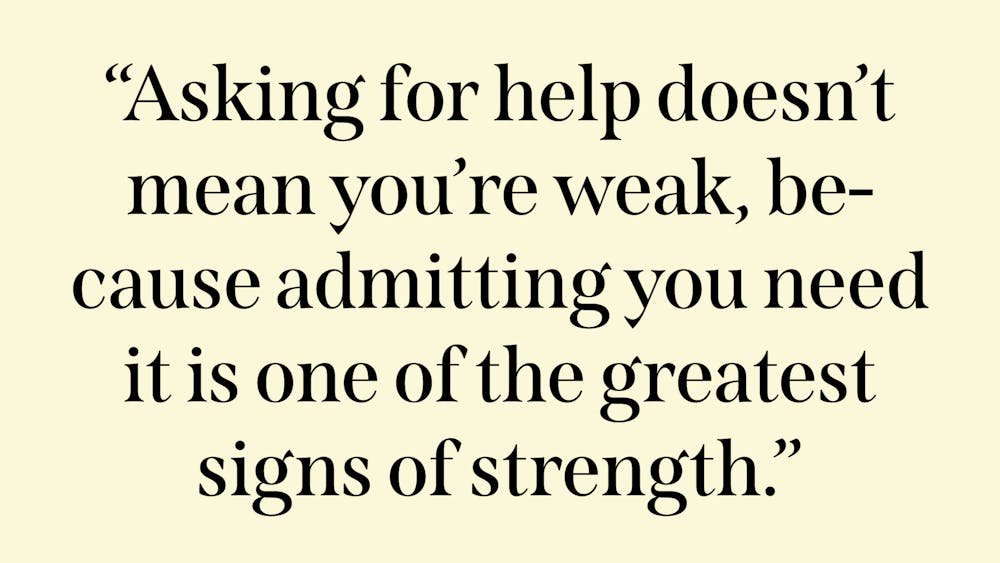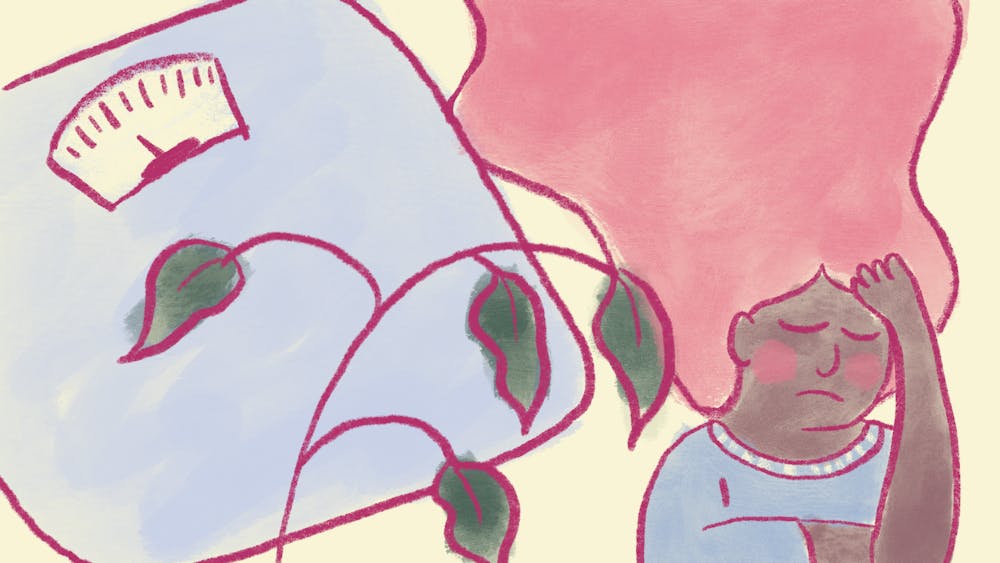Content warning: The following article includes mentions of suicide and eating disorders and can be disturbing or triggering for some readers. Please find resources listed at the bottom of the article.
My story begins in 2018 during my first year at Penn. To put it simply, my transition to college was a rocky one. I had been so excited to come here, but that feeling only lasted until I received my first midterm grades. I had moved across the country and was away from my family for the first time. My entire life, I had easily ranked at the top of my class. When I got to Penn, everything changed. Not only did I receive my first B, but also my first F.
For the first time in my life, I felt nothing but ordinary. And I began to doubt myself. Being surrounded by such talented and accomplished individuals really made me question my abilities. Previously, things came to me naturally. But this? Penn was an entirely different level.
My stress continued to build. I could spot success everywhere around me. I felt overwhelmed by club applications, searching for internships, and trying to make new friends, while also balancing my classes. But I had so many people counting on me back home—I was supposed to be the one to “change the world.” How could I do that if I couldn’t even get through calculus?
What made things especially hard was the fact that I felt like I couldn’t let anyone understand my struggles—both physical and emotional. “Penn Face” was my constant accessory, a mask I wore every day no matter how exhausting it would soon become.
It was when I found myself in my graduate resident advisor's room that I finally made the bold decision to ask for help. “All I feel is sad, and no matter what I do I can never shake it. I have never felt this way.” With tears in both of our eyes, he engulfed me in a hug and encouraged me to visit Counseling and Psychological Services. He told me, “There is nothing wrong with needing help, because I have felt the same way myself.”
In that moment, I was no longer alone in my struggles. But as the small green brochure stared back at me, I knew I wasn’t strong enough to make the call. What was I supposed to say on the phone? How did therapy even work? Feeling even more overwhelmed, I tucked the pamphlet into my backpack and stuck to what I was used to doing—“I can handle this by myself.”
The mask went back up.

Soon after, when my GA asked me if I had scheduled an appointment, I decided to finally set one up. “It's not like anything could get worse,” I thought to myself. Nervously entering uncharted territory, I opened up to my therapist and began meeting with her weekly throughout the spring of my first year. Despite this, I struggled through one of my most difficult semesters at Penn, battling severe anxiety and depression. But with a smile on my face, I managed to get my highest semester GPA yet: a 4.0. And not a single person knew of my inner turmoils.
Despite my high GPA and my therapy appointments, I slowly lost interest in everything I used to love. I became physically sick from the stress. When I came home that May, I was a shell of a person. After a few days, I returned to Pennsylvania for my internship. I didn’t want to work that summer and be away from home, but I felt that I had no other option besides working. I devastatingly thought that if I didn’t start my career now, it would affect my sophomore and junior summers, and then I would never succeed. And the prospect of success was the reason why I was going through all of this, right?
“It would be worth it in the end,” I told myself. But as I lived by myself, my mental health only continued to suffer. It became harder and harder to get out of bed, and my personal hygiene embarked on a decline.
But the most troubling part was how I had fallen headfirst into an eating disorder.
It was never just about the food. It was about the control I felt when the rest of my world was falling apart. Over the next few months, I stopped looking like the person I was when I entered Penn. I was barely recognizable.
Eating disorders are not glamorous. As a kid, I dreamed of having the self–control others did regarding food. But to be honest, I had no idea of the damage my eating disorder was doing to my life. One "wrong" choice slowly took over my entire world. While my body had transformed into what I had once yearned for, I hated it now more than ever.
I was constantly sick, cold, and in debt from buying food that didn’t satisfy me in the first place. I weighed myself dozens of times a day, experiencing such bad chest pain that it warranted serious medical concerns. I was malnourished, dehydrated, and absolutely consumed by my eating disorder. While I was certainly fighting my battle against anxiety and depression, I was also fighting a larger one against myself.
To others, I was the person always cracking jokes and making others laugh. The last thing people thought was that I was fighting my own demons. I remember telling my therapist, “I don’t understand how no one has realized I’ve worn these pants three days in a row? Or how my hair has been matted for months … I cannot be doing that good of a job.” I had a friend tell me that I was the person no one worried about because I was always so happy.
I’ve found that depression is often seen in the person you never would’ve thought of—because the weight of making everyone else happy eventually takes its toll. But the show got harder to maintain. I felt that taking one wrong step would result in the entire world crashing down, so I held the weight of the world on my shoulders.
I’m so grateful I had my therapist to share a little bit of that load with. With her support, we weathered through one of the most difficult years of my life. I had never talked to another person about my secrets. And finding that person in my therapist was a comfort I never thought was possible. I can’t even begin to imagine how I would have made it through that period without her.
Either way, though, there was always that voice telling me that I was exaggerating and bothering people with things I should be able to handle on my own. Things deteriorated quickly.
I don’t remember the first time I questioned how much longer I could go on like this. It began quietly: a voice saying that things might be a bit easier if an end was in sight, one whispering that the world might be better off without me. Responding to a text or brushing my teeth seemed meaningless in comparison.
I finally paused and realized the trouble I was in. I had been living in my dorm room for months, with my only company being swarms of bugs and my own vomit. I had been sick for two and a half months, and felt myself on the verge of passing out. My therapist became worried about my heart. After constantly telling myself that everything was fine, I finally accepted that it was too much for me to handle on my own.
I still remember the first time my therapist asked if I knew of Student Intervention Services, a department at Penn dedicated to helping students with immediate needs like mine. After a couple of weeks of her pushing me to meet with them, I decided to see what help I could receive—even though I didn’t believe I deserved it. I began to believe that this world—the one I created—was what I was destined for.
I found myself walking to the SIS office on a cold, December afternoon during finals week. I was stressed from studying, and there was nothing that I wanted to be doing less. When I introduced myself, I put on my normal, upbeat performance, but it didn’t last once we started talking about why I was there.

It was clear to everyone but myself that I needed treatment for my eating disorder. When I was asked what stopped me from seeking it, my two answers were “the cost, and that my parents would never let me.” My parents had no idea what was going on. I was using CAPS for free therapy and paying for my prescriptions out of pocket. They didn’t know that their little girl had been taken hostage, transformed into a person they would hardly recognize.
I just couldn’t bring myself to let them down.
At the beginning of the session, I lied about what my parents did for work. Once I realized SIS was there to help, I mentioned that my dad had recently lost his job.
What the SIS department did for me goes far beyond the first steps they took, such as providing me a new place to stay and finding a way to clean my dorm room (which was all I had wanted anyways). They helped me speak with Student Financial Services to reevaluate my package due to my dad’s change in employment. While that helped cover the cost, the real problem was telling my parents.
My parents both immigrated to the United States from developing countries, so the concept of mental health to them was as foreign as they are. In a world where they grew up focused on basic needs like food and water, psychological needs weren’t talked about—and that compounded the guilt I felt. I had parents who had sacrificed so much for me to have this opportunity. I had grown up hearing stories of them literally begging for food, and now I have to face them and say I have an eating disorder? But I had to recognize that this problem had become more than I could handle.
SIS determined that my mom needed to be with me and helped me tell her what had happened. My dad was the real challenge. He was the true decision maker, and with his religious background, I knew that his first answer would be prayer.
SIS gave me every resource at their disposal: “Do we need to find a man from his home country? We could also try the priest if that will be helpful?”In a world where I thought that I no longer mattered, for some strange reason to these people, I did. With my mom, my treatment team, and SIS at my side, we took on explaining to my father that I needed treatment.
The meeting with my dad worked. Finally, I was able to start treatment and work on taking my life back. I realize how incredibly fortunate I was to be in that position and even receive treatment, as some aren’t as lucky as I was. I never dreamed to be in the position that I am today, and I know that I didn't do it by myself.
Before I found help, I had somewhere along the way made a decision that would’ve forever changed the lives of those around me. I began giving gifts and saying my goodbyes. The thought that the pain I was enduring would soon end had slightly comforted me.
Now I see what a terrible mistake it would have been. My depression was blinding me from the fact that things could—and indeed did—get better. While I thought I would be ending my own pain, I would have instead passed it onto my loved ones. I now know that if one sibling ends their life, that the remaining siblings are up to three times as likely to do the same thing. Looking back, the mere thought of extending what I went through is unbearable.
If you find yourself with the questions I had only two years ago, I can tell you with 100% certainty that you do indeed make this world a better place. As cliché as it sounds, I can confidently say that there is at least one person whose day you make just a little bit better by simply being in it. From something as simple as the person you held the door open for to the security guard that you smile at every Tuesday, you continually make this world brighter.
And it’s for your own sake, too. You have so many great moments for yourself. Sometimes you laugh so hard that your stomach hurts, or you tell a story about something that you love and your eyes light up the room. There are so many more moments that you have yet to experience and so many memories left for you to create.
Asking for help doesn’t mean you’re weak, because admitting you need it is one of the greatest signs of strength. It can start as something as simple as reaching out to your GA, but I promise that seeking out the right resources can truly make all the difference.
As I end my senior spring, I can literally count how many days I’ve experienced that I never planned on having. From the extra 881 days I was given, I’ve created some of my greatest memories. I’ve met so many new people who have made such an impact on my life, and I’ve been able to make an impact on their lives as well. With every day, the ripple I make on this world grows bigger and bigger—and that was the missing puzzle piece I didn’t realize I needed. Every new day brings another opportunity to spread my light in ways I never thought possible.
This journey has taught me so much about myself. Overcoming my eating disorder was the hardest thing I have ever done. Now, I look back and don’t even recognize the girl trapped in her dorm room in 2019—the girl who had lost hope that things would ever get better.
If you find yourself lost and are contemplating asking for help, I hope my story serves as an example of an interaction with Penn where things did in fact get better. I know that Penn doesn’t have the best reputation for helping struggling students, and I don’t want to invalidate those who didn’t have a positive experience. However, I promise there are people here that care, people who actually spend their entire days trying to help students like you and me.
So, I encourage you to lower that mask just a little bit, as that might make all the difference. All you have to do is try.
Campus Resources:
The HELP Line: 215-898-HELP: A 24–hour–a–day phone number for members of the Penn community who seek help in navigating Penn's resources for health and wellness.
Counseling and Psychological Services: 215-898-7021 (active 24/7): The counseling center for the University of Pennsylvania.
Student Health Service: 215-746-3535: Student Health Service can provide medical evaluations and treatment to victims/survivors of eating disorders, regardless of whether they make a report or seek additional resources.
Reach–A–Peer Hotline: 215-573-2727 (every day from 9 p.m. to 1 a.m., texting available 24/7): A peer hotline to provide peer support, information, and referrals to Penn students.

